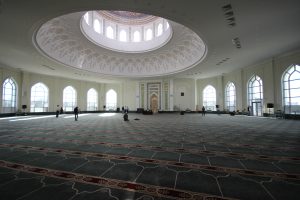When President Shavkat Mirziyoyev came to power in 2016, he offered greater religious freedom as part of the social contract in exchange for accepting the legitimacy of his government and maintaining political and social order. Numerous changes ensued, including the removal of 20,000 individuals from a blacklist of religious extremists, the release of 3,500 people incarcerated under religious extremism and terrorism charges, permission for nationwide use of loudspeakers in mosques to announce the call for prayer, and greater participation of government officials in religious rituals. Even the controversial rule of barring female students from wearing hijabs in state educational facilities was relaxed in September 2021 by allowing women to tie a headscarf at the back, without covering the neck.
The most profound effect of greater religious freedom in Uzbekistan, however, was the proliferation of mainly pseudo and sometimes fully government-appointed religious scholars who easily gained large followings among the domestic population. On social media such individuals have large followings compared to other voices on social media. These new advocates and “scholars” are free to broadcast, though their teachings often blur the line between religion and their personal views. This unleashed freedom in expression is increasingly allowing unsavory and extreme messages to reach audiences and gain support. This, in turn, is causing concern in the government.
One and so far the only entity that is trying to stage a defense against the inflow of moral and religious information is the Ministry of Justice of Uzbekistan. The ministry issued two relevant statements within the past five months, the latest issued on February 8. The statements warn of legal repercussions and possible social consequences if such broadcasts are not tempered.
In both messages, the ministry sent a signal to the rest of the government and a warning to the outspoken. The statements speak about the challenges religious “scholars” pose to the state’s secular laws when they share with their followers messages of what is morally right and wrong. Given that such divisive “scholars” have large followings, the ministry is likely sensing that their audiences are easily swayed toward views presented by “scholars.”
In the latest statement, the ministry said that religious organizations and figures continued propagating divisive ideas among the population by judging certain segments of the society who are not aligned with their view of what is morally good or bad. The ministry outlined a phenomenon where rule of law is sidelined for the sake of the rules and moral views by religious “scholars” and warned of an impending split in the society if these messages are allowed to proliferate.
The ministry’s earlier statement, made in September 2021, was its first attempt to keep at bay the spread of extreme ideas. It was more explicit in describing the developments in the country. The ministry outlined several troubling messages, such as calls for restricting women’s driving and their choice of activities, banning certain types of art, and inciting negative views toward those who are not followers of Islam. The ministry requested that people keep their individual religious views and moral values, in particular those that contradict the Constitution of Uzbekistan and the Universal Declaration of Human Rights, personal and not broadcast them through religious teachings. The ministry reiterated that Uzbekistan is a secular state and any of its subjects are free to choose any, or no, religion.
The ministry is trying to impose from the top a separation of the state and moral and religious beliefs by pointing to current laws and the constitution, but it seems it is the sole body waging this war. Given how restrictive religious practice was only several years ago, other parts of the government seem notably oblivious to extreme messaging.
According to the ministry’s 2021 assessment, “Observations show that there have been cases of attempts to turn moral and religious views into the subject of legal relations, as well as cases of information propaganda that are contrary to our national values and suppress and restrict the personal rights of people.”
The moral and religious views of charismatic individuals with sizable followings are spreading to mainstream society. The teachings of such “scholars” are loaded with personal moral and ethical rules, often with the tacit support of government. The Ministry of Justice of Uzbekistan finds itself in the middle of the battle with surprisingly no other government partners given how anti-religious all parts of the government were only several years ago. The ministry’s approach so far has been to warn and remind Uzbeks to respect other people’s choices and abide by the secular laws.

































